Commonwealth Bank Australia: Analysis of Business Code of Ethics
VerifiedAdded on 2024/06/21
|9
|2481
|271
Report
AI Summary
This report provides an analysis of the code of ethics at Commonwealth Bank Australia, addressing critical issues such as corruption, exploitation, dishonest and fraudulent behavior, discrimination, and whistleblower protection. It highlights instances of corruption within the bank, including crooked plans and management cover-ups, and defines corruption as a deviation from formal duties for private gain. The report also discusses exploitation, particularly through cold-calling tactics, and fraudulent behavior, such as misleading customers about insurance coverage. Discrimination cases, especially concerning accessibility for visually impaired customers, are examined. The case of whistleblower Jeff Morris, who faced significant personal repercussions for exposing corrupt practices, underscores the importance of whistleblower protection. The report concludes by outlining enforcement measures for the code of ethics, including employee education, ethics committee investigations, and penalties for unethical behavior, aiming to foster a culture of ethical conduct within Commonwealth Bank Australia. Desklib provides access to similar solved assignments for students.

Paraphrase This Document
Need a fresh take? Get an instant paraphrase of this document with our AI Paraphraser
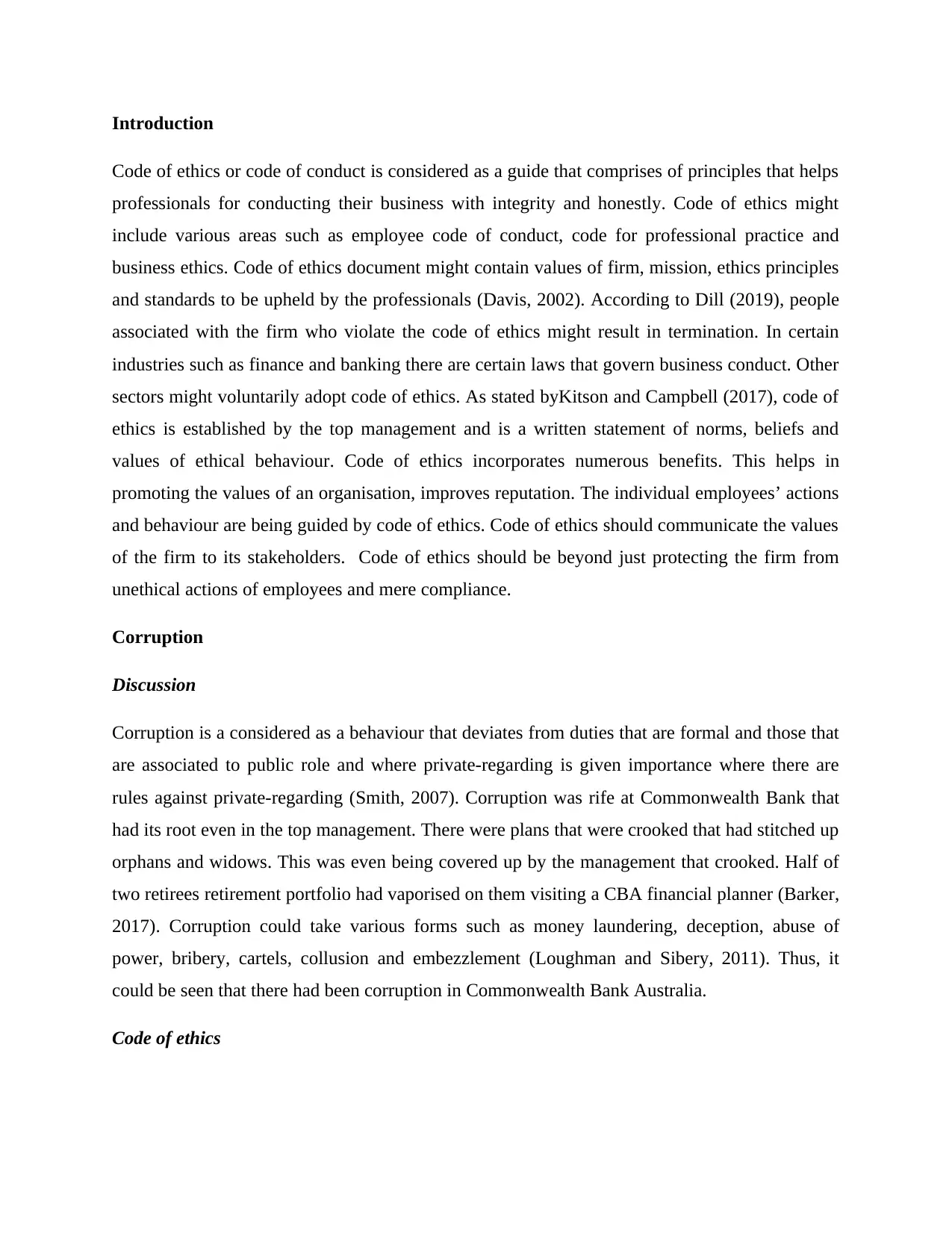
Introduction
Code of ethics or code of conduct is considered as a guide that comprises of principles that helps
professionals for conducting their business with integrity and honestly. Code of ethics might
include various areas such as employee code of conduct, code for professional practice and
business ethics. Code of ethics document might contain values of firm, mission, ethics principles
and standards to be upheld by the professionals (Davis, 2002). According to Dill (2019), people
associated with the firm who violate the code of ethics might result in termination. In certain
industries such as finance and banking there are certain laws that govern business conduct. Other
sectors might voluntarily adopt code of ethics. As stated byKitson and Campbell (2017), code of
ethics is established by the top management and is a written statement of norms, beliefs and
values of ethical behaviour. Code of ethics incorporates numerous benefits. This helps in
promoting the values of an organisation, improves reputation. The individual employees’ actions
and behaviour are being guided by code of ethics. Code of ethics should communicate the values
of the firm to its stakeholders. Code of ethics should be beyond just protecting the firm from
unethical actions of employees and mere compliance.
Corruption
Discussion
Corruption is a considered as a behaviour that deviates from duties that are formal and those that
are associated to public role and where private-regarding is given importance where there are
rules against private-regarding (Smith, 2007). Corruption was rife at Commonwealth Bank that
had its root even in the top management. There were plans that were crooked that had stitched up
orphans and widows. This was even being covered up by the management that crooked. Half of
two retirees retirement portfolio had vaporised on them visiting a CBA financial planner (Barker,
2017). Corruption could take various forms such as money laundering, deception, abuse of
power, bribery, cartels, collusion and embezzlement (Loughman and Sibery, 2011). Thus, it
could be seen that there had been corruption in Commonwealth Bank Australia.
Code of ethics
Code of ethics or code of conduct is considered as a guide that comprises of principles that helps
professionals for conducting their business with integrity and honestly. Code of ethics might
include various areas such as employee code of conduct, code for professional practice and
business ethics. Code of ethics document might contain values of firm, mission, ethics principles
and standards to be upheld by the professionals (Davis, 2002). According to Dill (2019), people
associated with the firm who violate the code of ethics might result in termination. In certain
industries such as finance and banking there are certain laws that govern business conduct. Other
sectors might voluntarily adopt code of ethics. As stated byKitson and Campbell (2017), code of
ethics is established by the top management and is a written statement of norms, beliefs and
values of ethical behaviour. Code of ethics incorporates numerous benefits. This helps in
promoting the values of an organisation, improves reputation. The individual employees’ actions
and behaviour are being guided by code of ethics. Code of ethics should communicate the values
of the firm to its stakeholders. Code of ethics should be beyond just protecting the firm from
unethical actions of employees and mere compliance.
Corruption
Discussion
Corruption is a considered as a behaviour that deviates from duties that are formal and those that
are associated to public role and where private-regarding is given importance where there are
rules against private-regarding (Smith, 2007). Corruption was rife at Commonwealth Bank that
had its root even in the top management. There were plans that were crooked that had stitched up
orphans and widows. This was even being covered up by the management that crooked. Half of
two retirees retirement portfolio had vaporised on them visiting a CBA financial planner (Barker,
2017). Corruption could take various forms such as money laundering, deception, abuse of
power, bribery, cartels, collusion and embezzlement (Loughman and Sibery, 2011). Thus, it
could be seen that there had been corruption in Commonwealth Bank Australia.
Code of ethics
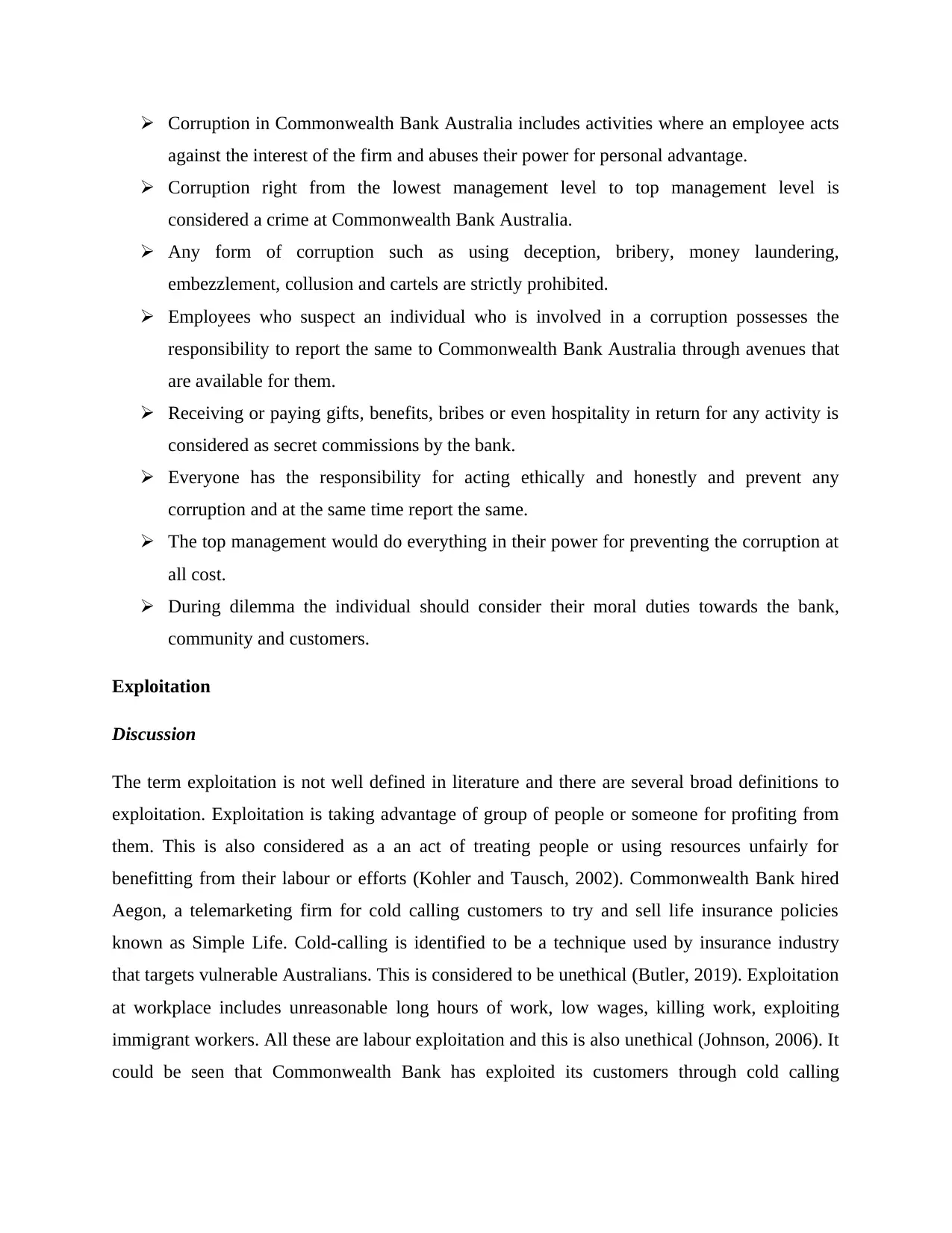
Corruption in Commonwealth Bank Australia includes activities where an employee acts
against the interest of the firm and abuses their power for personal advantage.
Corruption right from the lowest management level to top management level is
considered a crime at Commonwealth Bank Australia.
Any form of corruption such as using deception, bribery, money laundering,
embezzlement, collusion and cartels are strictly prohibited.
Employees who suspect an individual who is involved in a corruption possesses the
responsibility to report the same to Commonwealth Bank Australia through avenues that
are available for them.
Receiving or paying gifts, benefits, bribes or even hospitality in return for any activity is
considered as secret commissions by the bank.
Everyone has the responsibility for acting ethically and honestly and prevent any
corruption and at the same time report the same.
The top management would do everything in their power for preventing the corruption at
all cost.
During dilemma the individual should consider their moral duties towards the bank,
community and customers.
Exploitation
Discussion
The term exploitation is not well defined in literature and there are several broad definitions to
exploitation. Exploitation is taking advantage of group of people or someone for profiting from
them. This is also considered as a an act of treating people or using resources unfairly for
benefitting from their labour or efforts (Kohler and Tausch, 2002). Commonwealth Bank hired
Aegon, a telemarketing firm for cold calling customers to try and sell life insurance policies
known as Simple Life. Cold-calling is identified to be a technique used by insurance industry
that targets vulnerable Australians. This is considered to be unethical (Butler, 2019). Exploitation
at workplace includes unreasonable long hours of work, low wages, killing work, exploiting
immigrant workers. All these are labour exploitation and this is also unethical (Johnson, 2006). It
could be seen that Commonwealth Bank has exploited its customers through cold calling
against the interest of the firm and abuses their power for personal advantage.
Corruption right from the lowest management level to top management level is
considered a crime at Commonwealth Bank Australia.
Any form of corruption such as using deception, bribery, money laundering,
embezzlement, collusion and cartels are strictly prohibited.
Employees who suspect an individual who is involved in a corruption possesses the
responsibility to report the same to Commonwealth Bank Australia through avenues that
are available for them.
Receiving or paying gifts, benefits, bribes or even hospitality in return for any activity is
considered as secret commissions by the bank.
Everyone has the responsibility for acting ethically and honestly and prevent any
corruption and at the same time report the same.
The top management would do everything in their power for preventing the corruption at
all cost.
During dilemma the individual should consider their moral duties towards the bank,
community and customers.
Exploitation
Discussion
The term exploitation is not well defined in literature and there are several broad definitions to
exploitation. Exploitation is taking advantage of group of people or someone for profiting from
them. This is also considered as a an act of treating people or using resources unfairly for
benefitting from their labour or efforts (Kohler and Tausch, 2002). Commonwealth Bank hired
Aegon, a telemarketing firm for cold calling customers to try and sell life insurance policies
known as Simple Life. Cold-calling is identified to be a technique used by insurance industry
that targets vulnerable Australians. This is considered to be unethical (Butler, 2019). Exploitation
at workplace includes unreasonable long hours of work, low wages, killing work, exploiting
immigrant workers. All these are labour exploitation and this is also unethical (Johnson, 2006). It
could be seen that Commonwealth Bank has exploited its customers through cold calling
⊘ This is a preview!⊘
Do you want full access?
Subscribe today to unlock all pages.

Trusted by 1+ million students worldwide
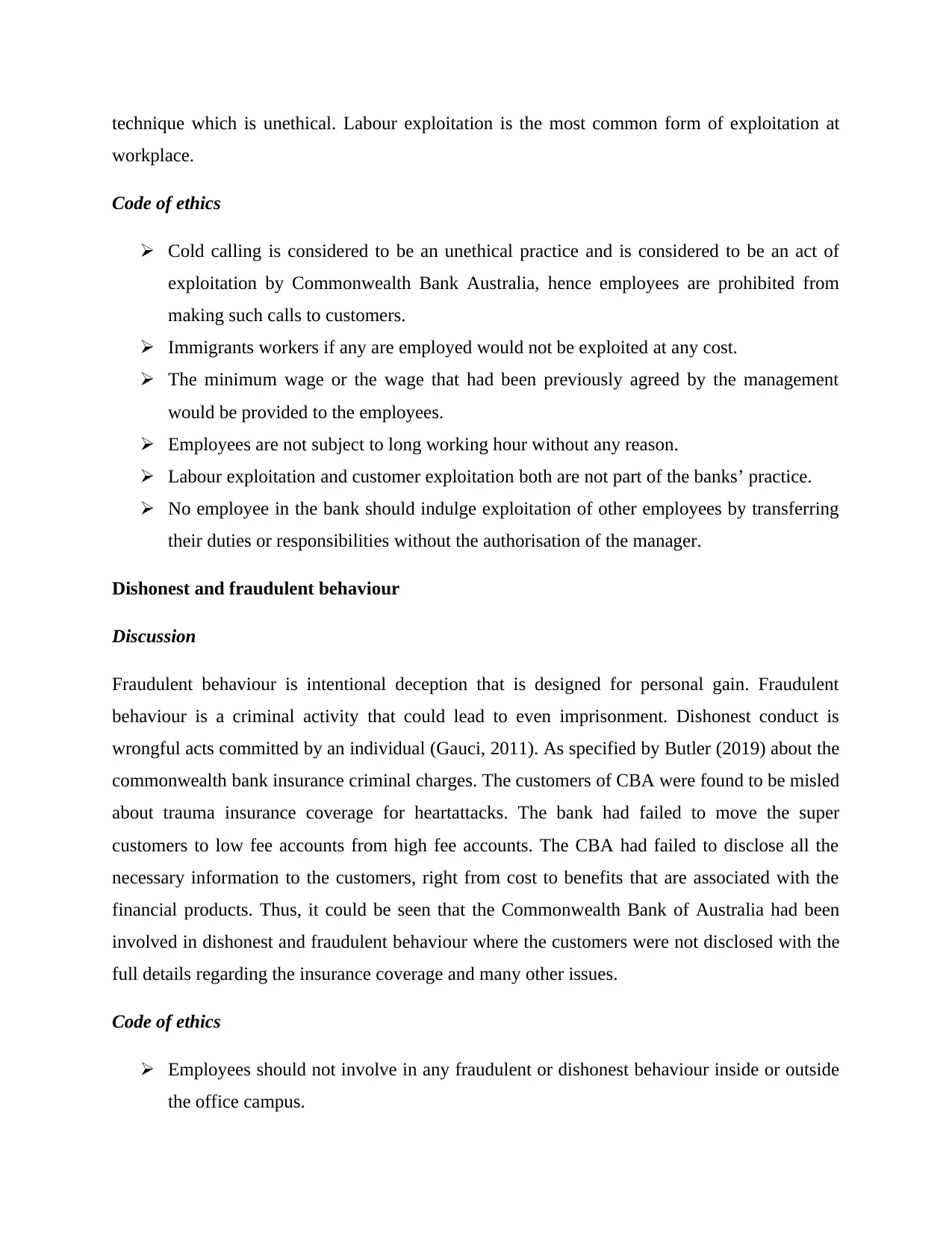
technique which is unethical. Labour exploitation is the most common form of exploitation at
workplace.
Code of ethics
Cold calling is considered to be an unethical practice and is considered to be an act of
exploitation by Commonwealth Bank Australia, hence employees are prohibited from
making such calls to customers.
Immigrants workers if any are employed would not be exploited at any cost.
The minimum wage or the wage that had been previously agreed by the management
would be provided to the employees.
Employees are not subject to long working hour without any reason.
Labour exploitation and customer exploitation both are not part of the banks’ practice.
No employee in the bank should indulge exploitation of other employees by transferring
their duties or responsibilities without the authorisation of the manager.
Dishonest and fraudulent behaviour
Discussion
Fraudulent behaviour is intentional deception that is designed for personal gain. Fraudulent
behaviour is a criminal activity that could lead to even imprisonment. Dishonest conduct is
wrongful acts committed by an individual (Gauci, 2011). As specified by Butler (2019) about the
commonwealth bank insurance criminal charges. The customers of CBA were found to be misled
about trauma insurance coverage for heartattacks. The bank had failed to move the super
customers to low fee accounts from high fee accounts. The CBA had failed to disclose all the
necessary information to the customers, right from cost to benefits that are associated with the
financial products. Thus, it could be seen that the Commonwealth Bank of Australia had been
involved in dishonest and fraudulent behaviour where the customers were not disclosed with the
full details regarding the insurance coverage and many other issues.
Code of ethics
Employees should not involve in any fraudulent or dishonest behaviour inside or outside
the office campus.
workplace.
Code of ethics
Cold calling is considered to be an unethical practice and is considered to be an act of
exploitation by Commonwealth Bank Australia, hence employees are prohibited from
making such calls to customers.
Immigrants workers if any are employed would not be exploited at any cost.
The minimum wage or the wage that had been previously agreed by the management
would be provided to the employees.
Employees are not subject to long working hour without any reason.
Labour exploitation and customer exploitation both are not part of the banks’ practice.
No employee in the bank should indulge exploitation of other employees by transferring
their duties or responsibilities without the authorisation of the manager.
Dishonest and fraudulent behaviour
Discussion
Fraudulent behaviour is intentional deception that is designed for personal gain. Fraudulent
behaviour is a criminal activity that could lead to even imprisonment. Dishonest conduct is
wrongful acts committed by an individual (Gauci, 2011). As specified by Butler (2019) about the
commonwealth bank insurance criminal charges. The customers of CBA were found to be misled
about trauma insurance coverage for heartattacks. The bank had failed to move the super
customers to low fee accounts from high fee accounts. The CBA had failed to disclose all the
necessary information to the customers, right from cost to benefits that are associated with the
financial products. Thus, it could be seen that the Commonwealth Bank of Australia had been
involved in dishonest and fraudulent behaviour where the customers were not disclosed with the
full details regarding the insurance coverage and many other issues.
Code of ethics
Employees should not involve in any fraudulent or dishonest behaviour inside or outside
the office campus.
Paraphrase This Document
Need a fresh take? Get an instant paraphrase of this document with our AI Paraphraser
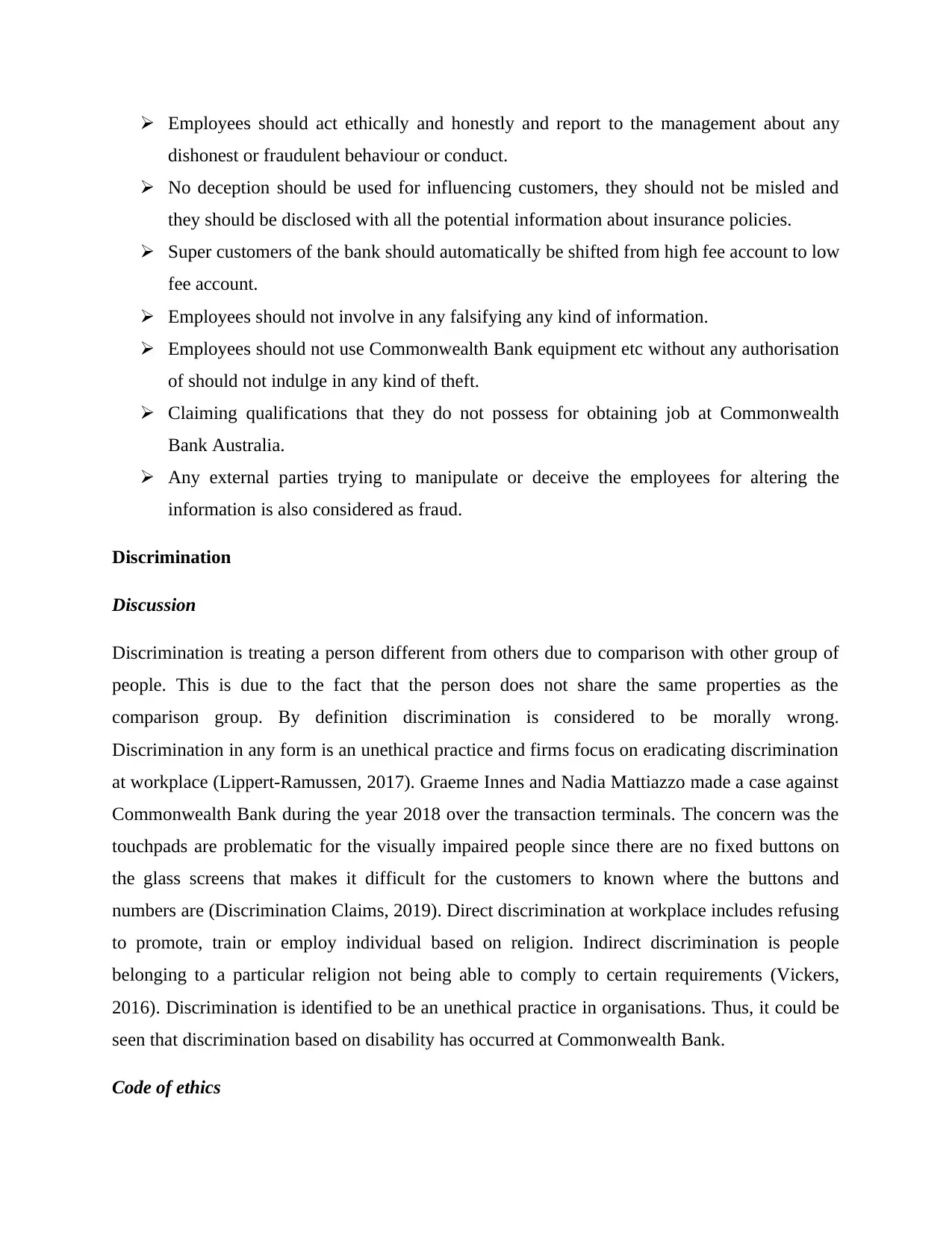
Employees should act ethically and honestly and report to the management about any
dishonest or fraudulent behaviour or conduct.
No deception should be used for influencing customers, they should not be misled and
they should be disclosed with all the potential information about insurance policies.
Super customers of the bank should automatically be shifted from high fee account to low
fee account.
Employees should not involve in any falsifying any kind of information.
Employees should not use Commonwealth Bank equipment etc without any authorisation
of should not indulge in any kind of theft.
Claiming qualifications that they do not possess for obtaining job at Commonwealth
Bank Australia.
Any external parties trying to manipulate or deceive the employees for altering the
information is also considered as fraud.
Discrimination
Discussion
Discrimination is treating a person different from others due to comparison with other group of
people. This is due to the fact that the person does not share the same properties as the
comparison group. By definition discrimination is considered to be morally wrong.
Discrimination in any form is an unethical practice and firms focus on eradicating discrimination
at workplace (Lippert-Ramussen, 2017). Graeme Innes and Nadia Mattiazzo made a case against
Commonwealth Bank during the year 2018 over the transaction terminals. The concern was the
touchpads are problematic for the visually impaired people since there are no fixed buttons on
the glass screens that makes it difficult for the customers to known where the buttons and
numbers are (Discrimination Claims, 2019). Direct discrimination at workplace includes refusing
to promote, train or employ individual based on religion. Indirect discrimination is people
belonging to a particular religion not being able to comply to certain requirements (Vickers,
2016). Discrimination is identified to be an unethical practice in organisations. Thus, it could be
seen that discrimination based on disability has occurred at Commonwealth Bank.
Code of ethics
dishonest or fraudulent behaviour or conduct.
No deception should be used for influencing customers, they should not be misled and
they should be disclosed with all the potential information about insurance policies.
Super customers of the bank should automatically be shifted from high fee account to low
fee account.
Employees should not involve in any falsifying any kind of information.
Employees should not use Commonwealth Bank equipment etc without any authorisation
of should not indulge in any kind of theft.
Claiming qualifications that they do not possess for obtaining job at Commonwealth
Bank Australia.
Any external parties trying to manipulate or deceive the employees for altering the
information is also considered as fraud.
Discrimination
Discussion
Discrimination is treating a person different from others due to comparison with other group of
people. This is due to the fact that the person does not share the same properties as the
comparison group. By definition discrimination is considered to be morally wrong.
Discrimination in any form is an unethical practice and firms focus on eradicating discrimination
at workplace (Lippert-Ramussen, 2017). Graeme Innes and Nadia Mattiazzo made a case against
Commonwealth Bank during the year 2018 over the transaction terminals. The concern was the
touchpads are problematic for the visually impaired people since there are no fixed buttons on
the glass screens that makes it difficult for the customers to known where the buttons and
numbers are (Discrimination Claims, 2019). Direct discrimination at workplace includes refusing
to promote, train or employ individual based on religion. Indirect discrimination is people
belonging to a particular religion not being able to comply to certain requirements (Vickers,
2016). Discrimination is identified to be an unethical practice in organisations. Thus, it could be
seen that discrimination based on disability has occurred at Commonwealth Bank.
Code of ethics
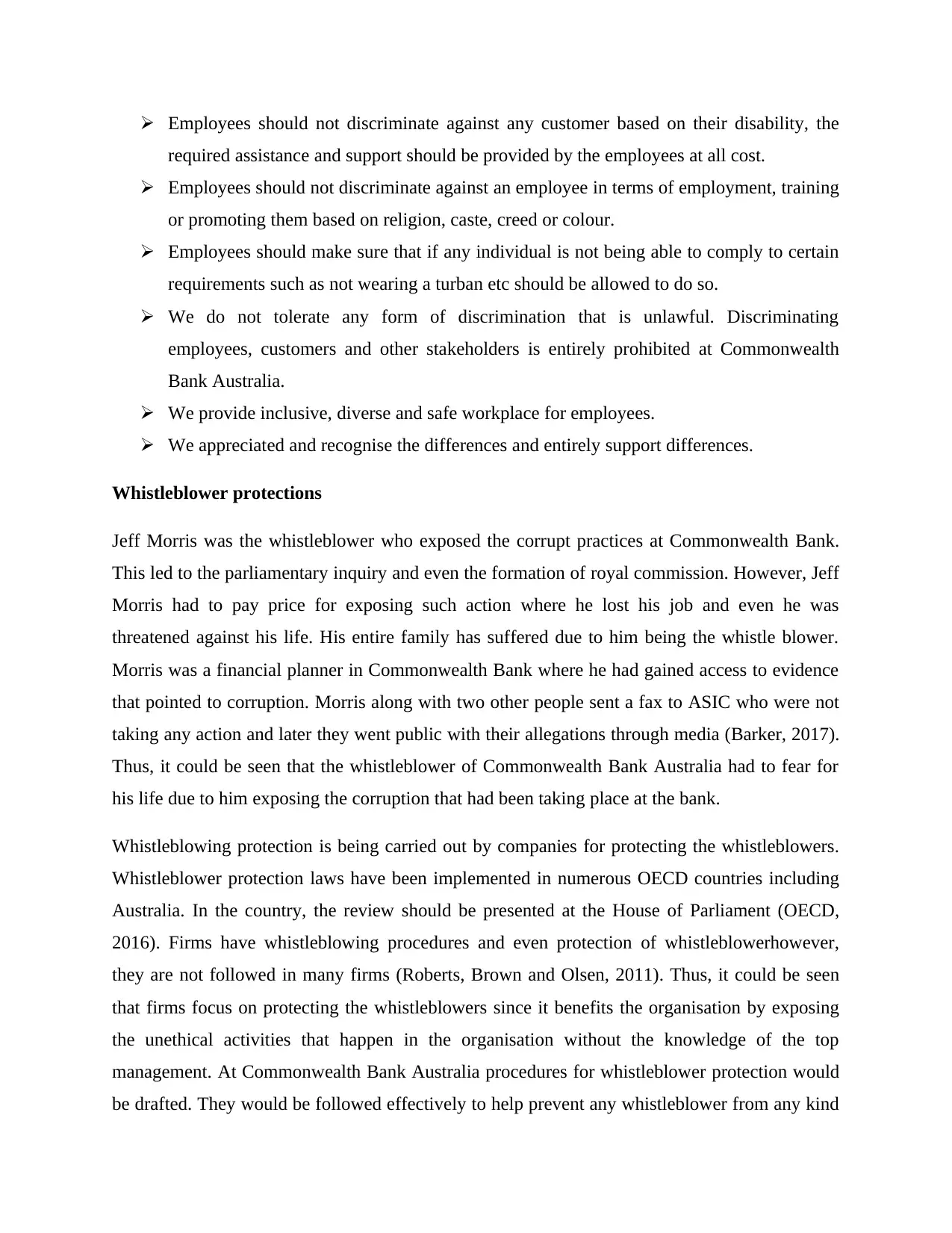
Employees should not discriminate against any customer based on their disability, the
required assistance and support should be provided by the employees at all cost.
Employees should not discriminate against an employee in terms of employment, training
or promoting them based on religion, caste, creed or colour.
Employees should make sure that if any individual is not being able to comply to certain
requirements such as not wearing a turban etc should be allowed to do so.
We do not tolerate any form of discrimination that is unlawful. Discriminating
employees, customers and other stakeholders is entirely prohibited at Commonwealth
Bank Australia.
We provide inclusive, diverse and safe workplace for employees.
We appreciated and recognise the differences and entirely support differences.
Whistleblower protections
Jeff Morris was the whistleblower who exposed the corrupt practices at Commonwealth Bank.
This led to the parliamentary inquiry and even the formation of royal commission. However, Jeff
Morris had to pay price for exposing such action where he lost his job and even he was
threatened against his life. His entire family has suffered due to him being the whistle blower.
Morris was a financial planner in Commonwealth Bank where he had gained access to evidence
that pointed to corruption. Morris along with two other people sent a fax to ASIC who were not
taking any action and later they went public with their allegations through media (Barker, 2017).
Thus, it could be seen that the whistleblower of Commonwealth Bank Australia had to fear for
his life due to him exposing the corruption that had been taking place at the bank.
Whistleblowing protection is being carried out by companies for protecting the whistleblowers.
Whistleblower protection laws have been implemented in numerous OECD countries including
Australia. In the country, the review should be presented at the House of Parliament (OECD,
2016). Firms have whistleblowing procedures and even protection of whistleblowerhowever,
they are not followed in many firms (Roberts, Brown and Olsen, 2011). Thus, it could be seen
that firms focus on protecting the whistleblowers since it benefits the organisation by exposing
the unethical activities that happen in the organisation without the knowledge of the top
management. At Commonwealth Bank Australia procedures for whistleblower protection would
be drafted. They would be followed effectively to help prevent any whistleblower from any kind
required assistance and support should be provided by the employees at all cost.
Employees should not discriminate against an employee in terms of employment, training
or promoting them based on religion, caste, creed or colour.
Employees should make sure that if any individual is not being able to comply to certain
requirements such as not wearing a turban etc should be allowed to do so.
We do not tolerate any form of discrimination that is unlawful. Discriminating
employees, customers and other stakeholders is entirely prohibited at Commonwealth
Bank Australia.
We provide inclusive, diverse and safe workplace for employees.
We appreciated and recognise the differences and entirely support differences.
Whistleblower protections
Jeff Morris was the whistleblower who exposed the corrupt practices at Commonwealth Bank.
This led to the parliamentary inquiry and even the formation of royal commission. However, Jeff
Morris had to pay price for exposing such action where he lost his job and even he was
threatened against his life. His entire family has suffered due to him being the whistle blower.
Morris was a financial planner in Commonwealth Bank where he had gained access to evidence
that pointed to corruption. Morris along with two other people sent a fax to ASIC who were not
taking any action and later they went public with their allegations through media (Barker, 2017).
Thus, it could be seen that the whistleblower of Commonwealth Bank Australia had to fear for
his life due to him exposing the corruption that had been taking place at the bank.
Whistleblowing protection is being carried out by companies for protecting the whistleblowers.
Whistleblower protection laws have been implemented in numerous OECD countries including
Australia. In the country, the review should be presented at the House of Parliament (OECD,
2016). Firms have whistleblowing procedures and even protection of whistleblowerhowever,
they are not followed in many firms (Roberts, Brown and Olsen, 2011). Thus, it could be seen
that firms focus on protecting the whistleblowers since it benefits the organisation by exposing
the unethical activities that happen in the organisation without the knowledge of the top
management. At Commonwealth Bank Australia procedures for whistleblower protection would
be drafted. They would be followed effectively to help prevent any whistleblower from any kind
⊘ This is a preview!⊘
Do you want full access?
Subscribe today to unlock all pages.

Trusted by 1+ million students worldwide
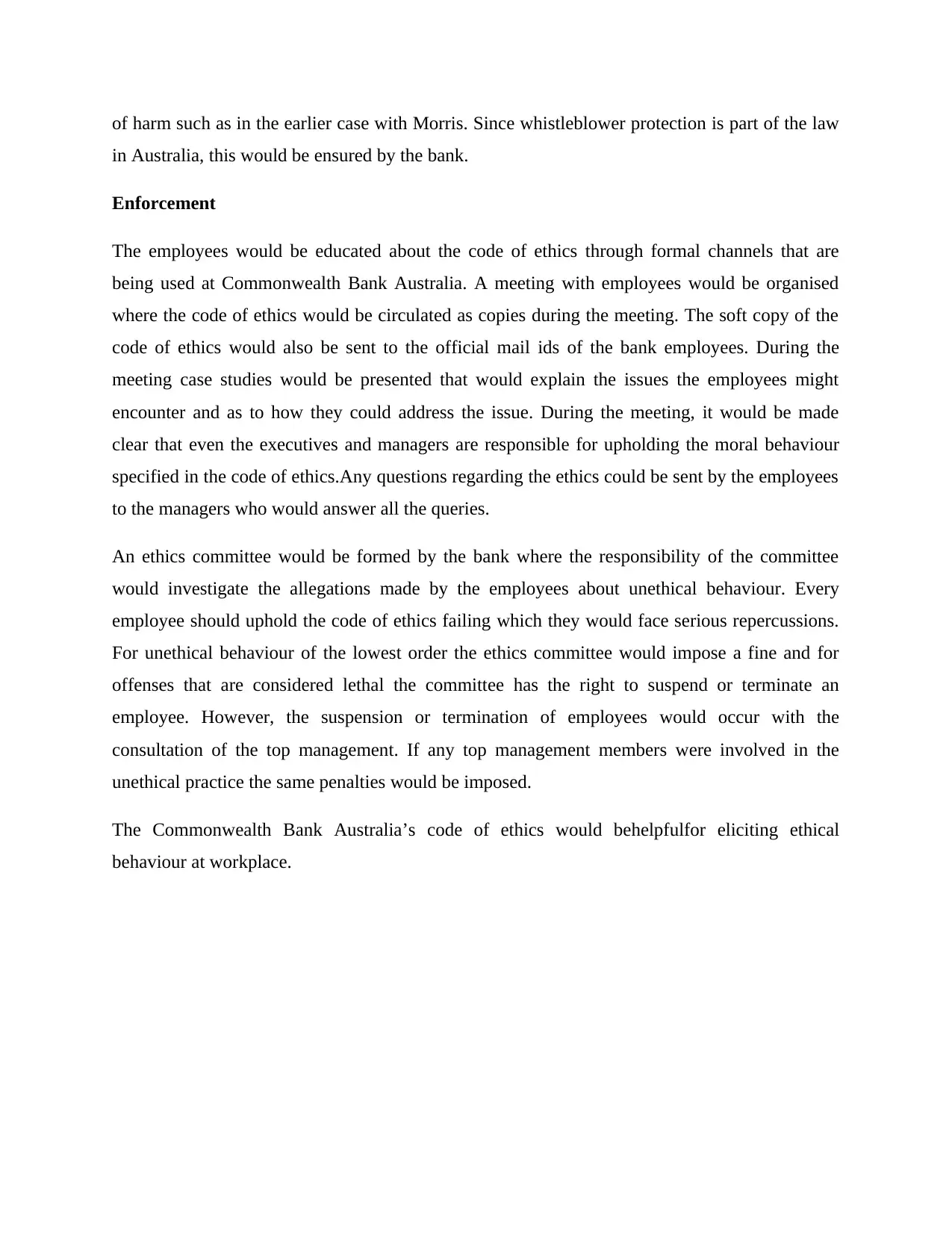
of harm such as in the earlier case with Morris. Since whistleblower protection is part of the law
in Australia, this would be ensured by the bank.
Enforcement
The employees would be educated about the code of ethics through formal channels that are
being used at Commonwealth Bank Australia. A meeting with employees would be organised
where the code of ethics would be circulated as copies during the meeting. The soft copy of the
code of ethics would also be sent to the official mail ids of the bank employees. During the
meeting case studies would be presented that would explain the issues the employees might
encounter and as to how they could address the issue. During the meeting, it would be made
clear that even the executives and managers are responsible for upholding the moral behaviour
specified in the code of ethics.Any questions regarding the ethics could be sent by the employees
to the managers who would answer all the queries.
An ethics committee would be formed by the bank where the responsibility of the committee
would investigate the allegations made by the employees about unethical behaviour. Every
employee should uphold the code of ethics failing which they would face serious repercussions.
For unethical behaviour of the lowest order the ethics committee would impose a fine and for
offenses that are considered lethal the committee has the right to suspend or terminate an
employee. However, the suspension or termination of employees would occur with the
consultation of the top management. If any top management members were involved in the
unethical practice the same penalties would be imposed.
The Commonwealth Bank Australia’s code of ethics would behelpfulfor eliciting ethical
behaviour at workplace.
in Australia, this would be ensured by the bank.
Enforcement
The employees would be educated about the code of ethics through formal channels that are
being used at Commonwealth Bank Australia. A meeting with employees would be organised
where the code of ethics would be circulated as copies during the meeting. The soft copy of the
code of ethics would also be sent to the official mail ids of the bank employees. During the
meeting case studies would be presented that would explain the issues the employees might
encounter and as to how they could address the issue. During the meeting, it would be made
clear that even the executives and managers are responsible for upholding the moral behaviour
specified in the code of ethics.Any questions regarding the ethics could be sent by the employees
to the managers who would answer all the queries.
An ethics committee would be formed by the bank where the responsibility of the committee
would investigate the allegations made by the employees about unethical behaviour. Every
employee should uphold the code of ethics failing which they would face serious repercussions.
For unethical behaviour of the lowest order the ethics committee would impose a fine and for
offenses that are considered lethal the committee has the right to suspend or terminate an
employee. However, the suspension or termination of employees would occur with the
consultation of the top management. If any top management members were involved in the
unethical practice the same penalties would be imposed.
The Commonwealth Bank Australia’s code of ethics would behelpfulfor eliciting ethical
behaviour at workplace.
Paraphrase This Document
Need a fresh take? Get an instant paraphrase of this document with our AI Paraphraser

Reference
Barker, A. 2017.Whistleblower Jeff Morris tells of horrific story. [online] Available at:
https://www.abc.net.au/news/2017-11-30/banking-whistleblower-jeff-morris-tells-of-horrific-
impact/9212536 [Accessed: 19 September 2020].
Butler, B. 2019.Commonwealth banks insurance arm faces criminal charges. [online] Available
at: <https://www.theguardian.com/news/2019/oct/04/commonwealth-bank-insurance-arm-faces-
87-criminal-charges> [Accessed: 19 September 2020].
Davis, M. 2002. Profession, code and ethics.Michigan: Ashgate.
Dill, A. 2019.Bank Regulation, Risk Management, and Compliance Theory, Practice, and Key
Problem Areas. New York: Taylor & Francis.
Discrimination Claims. 2019. Commonwealth Bank settles discrimination case. [online]
Available at: <https://discriminationclaims.com.au/commonwealth-bank-settles-discrimination-
case/> [Accessed: 19 September 2020].
Gauci, P. 2011. Regulating the British economy.New York: Ashgate.
Johnson, CD. 2006. Labour and workplace issues in literature. New York: Greenwood Press.
Kitson,AC. and Campbell,RC. 2017. The ethical organisation. New York: Palgrave Macmillan.
Kohler,G. and Tausch, A. 2002. Global Keynesianism Unequal Exchange and Global
Exploitation.New York: NOVA publishers.
Lippert-Ramussen, K. 2017.The Routledge Handbook of the Ethics of Discrimination.New York:
Taylor & Francis.
Loughman, BP. and Sibery, RA. 2011. Bribery and corruption navigating the global risks. New
Jersey: Wiley.
OECD. 2016. Committing to effective whistleblower protection. Paris: OECD.
Barker, A. 2017.Whistleblower Jeff Morris tells of horrific story. [online] Available at:
https://www.abc.net.au/news/2017-11-30/banking-whistleblower-jeff-morris-tells-of-horrific-
impact/9212536 [Accessed: 19 September 2020].
Butler, B. 2019.Commonwealth banks insurance arm faces criminal charges. [online] Available
at: <https://www.theguardian.com/news/2019/oct/04/commonwealth-bank-insurance-arm-faces-
87-criminal-charges> [Accessed: 19 September 2020].
Davis, M. 2002. Profession, code and ethics.Michigan: Ashgate.
Dill, A. 2019.Bank Regulation, Risk Management, and Compliance Theory, Practice, and Key
Problem Areas. New York: Taylor & Francis.
Discrimination Claims. 2019. Commonwealth Bank settles discrimination case. [online]
Available at: <https://discriminationclaims.com.au/commonwealth-bank-settles-discrimination-
case/> [Accessed: 19 September 2020].
Gauci, P. 2011. Regulating the British economy.New York: Ashgate.
Johnson, CD. 2006. Labour and workplace issues in literature. New York: Greenwood Press.
Kitson,AC. and Campbell,RC. 2017. The ethical organisation. New York: Palgrave Macmillan.
Kohler,G. and Tausch, A. 2002. Global Keynesianism Unequal Exchange and Global
Exploitation.New York: NOVA publishers.
Lippert-Ramussen, K. 2017.The Routledge Handbook of the Ethics of Discrimination.New York:
Taylor & Francis.
Loughman, BP. and Sibery, RA. 2011. Bribery and corruption navigating the global risks. New
Jersey: Wiley.
OECD. 2016. Committing to effective whistleblower protection. Paris: OECD.
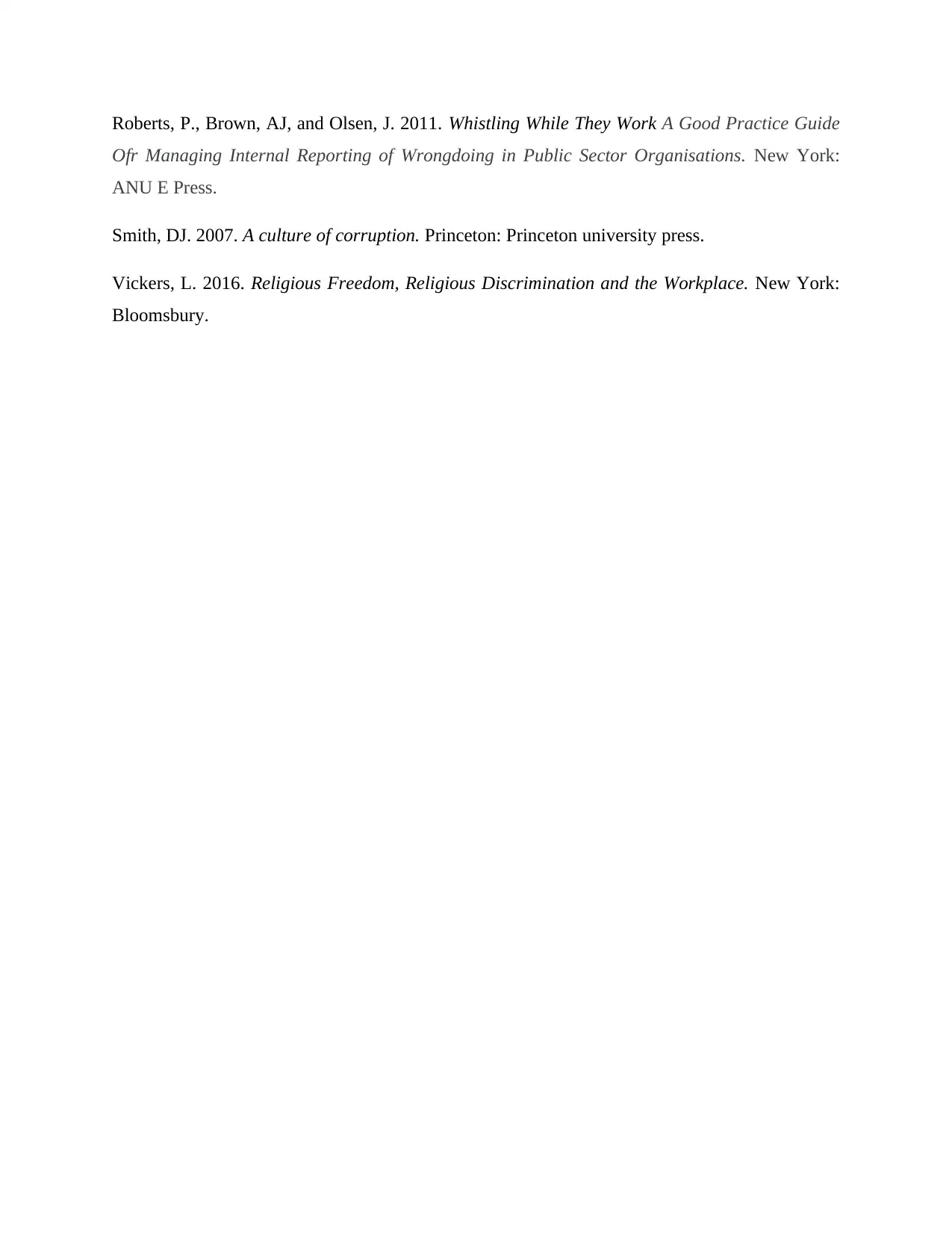
Roberts, P., Brown, AJ, and Olsen, J. 2011. Whistling While They Work A Good Practice Guide
Ofr Managing Internal Reporting of Wrongdoing in Public Sector Organisations. New York:
ANU E Press.
Smith, DJ. 2007. A culture of corruption. Princeton: Princeton university press.
Vickers, L. 2016. Religious Freedom, Religious Discrimination and the Workplace. New York:
Bloomsbury.
Ofr Managing Internal Reporting of Wrongdoing in Public Sector Organisations. New York:
ANU E Press.
Smith, DJ. 2007. A culture of corruption. Princeton: Princeton university press.
Vickers, L. 2016. Religious Freedom, Religious Discrimination and the Workplace. New York:
Bloomsbury.
⊘ This is a preview!⊘
Do you want full access?
Subscribe today to unlock all pages.

Trusted by 1+ million students worldwide
1 out of 9
Related Documents
Your All-in-One AI-Powered Toolkit for Academic Success.
+13062052269
info@desklib.com
Available 24*7 on WhatsApp / Email
![[object Object]](/_next/static/media/star-bottom.7253800d.svg)
Unlock your academic potential
Copyright © 2020–2026 A2Z Services. All Rights Reserved. Developed and managed by ZUCOL.


